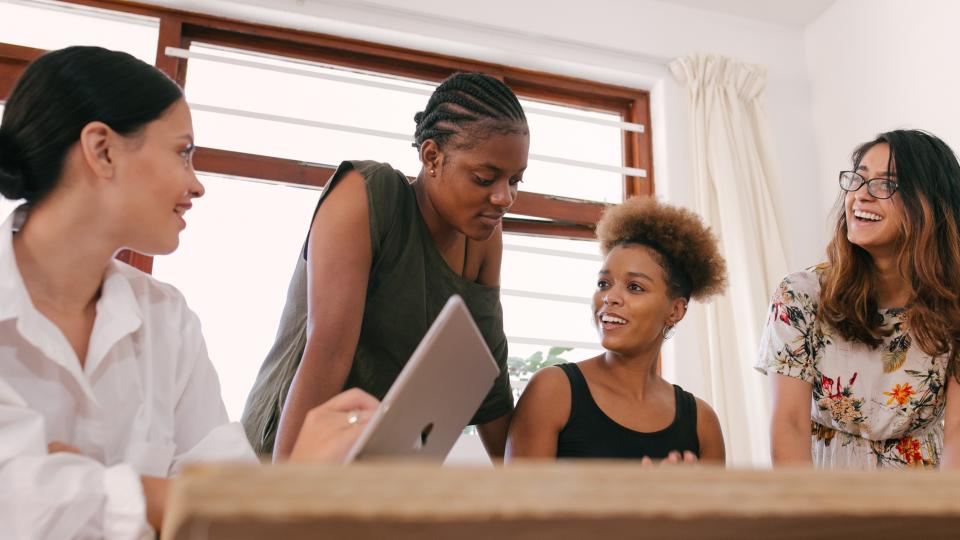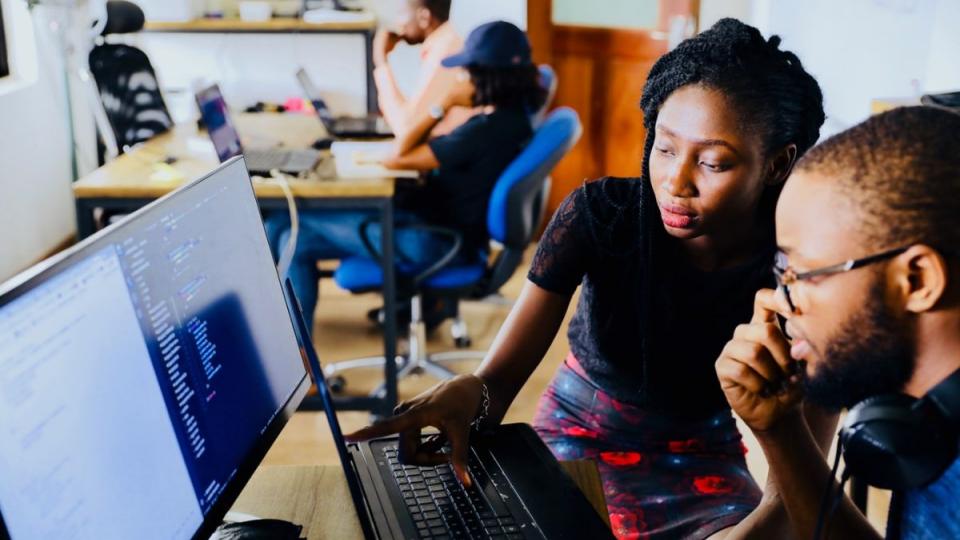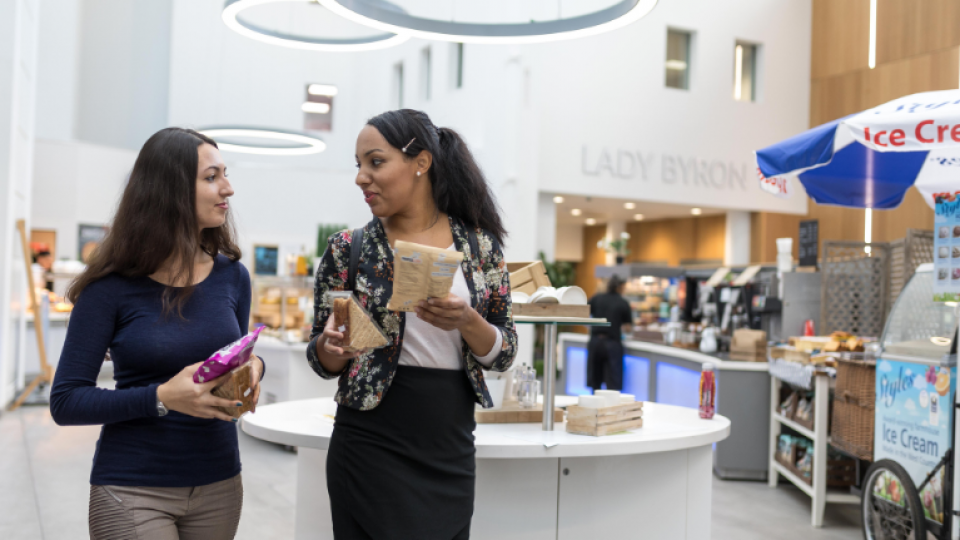
People Like Us toolkit
People like us toolkit
The People Like Us (PLU) is a collaborative project between the University of West London (lead institution), West London NHS Trust and UWL Students’ Union (UWLSU). It is part of a mental health funding competition from the Office for Students (OfS), which aims to develop racially and culturally competent mental health and wellbeing support for people coming from Black, Asian and ethnic minority communities who seem to be underrepresented in accessing early intervention for mental health and wellbeing support.
The main intervention of the project, which has been co-created by students and staff coming from Black, Asian and ethnic minority communities with lived experiences of mental health, is called the ‘Racial & Cultural Competent’.
-
The intervention includes the following activities:
- People Like Us: Face-to-face co-produced and co-delivered racially and culturally competent workshops for eight specific ethnic groups who are grouped under the ethnicity umbrella term of ‘Black, Asian and ethnic minority’. Hosted by practitioners.
- Virtual community for People Like Us: Online learning and engagement in co-produced racially and culturally competent resources using UWL’s Virtual Learning Environment. Hosted by facilitators with lived and trained experience.
- Content for People Like Us: Bitesize podcast sessions hosted on YouTube and Facebook by mental health professionals and those with lived experience.
What is the purpose of the toolkit?
The purpose of the toolkit is to contribute to the scalability and sustainability of the People Like Us. This is to increase the scope of developing racial and culturally competent interventions for mental health and wellbeing support for people coming from Black, Asian and ethnic minority communities across the sector. Specifically, this toolkit aims to:
-
Share our experience and lessons learned
-
Disseminate the activities developed so far through the work with UWL students and partners in supporting students’ mental health and wellbeing
-
Support OfS, higher education and health-related sectors in developing culturally competent interventions
Acknowledgments
-
Our funder, Office for Students
-
Our partners West London NHS Trust and UWLSU
-
UWL staff and students
Set up and introduction
The first step includes the vision and mission of the project and the initial planning before its development. There are three key areas that you need to consider in this stage, which are:
-
Plan and develop
The approach here is to:
Identify the project, scope, aims and objectives
Identify the Project Team and key stakeholders
Identify the target population
Identify communication channels, including students, for participants' recruitment processes
Estimate costs
Estimate the timeline and schedule of the activity
Determine robust evaluation framework, risks and constraints
-
Key lessons learned
What works: Collaborative approach across the partners. Each of the partners had expertise in a specific element of the project. Using this joint approach and sharing best practices helped the Project Team to have clear goals, targets and milestones, as well as clear expectations and continuous communication throughout the project's delivery.
What needs improvement: There was limited communication between the students. People Like Us Student Champions could possibly assist with the recruitment process. As an action, you can encourage students who have participated in the project to disseminate it to their fellow students.
-
Identify the targeted population and decide where to deploy the intervention
Review historical data to identify the target population where you would like to implement the intervention. Assess the importance of intersectionality when identifying such groups.
Identify which equality gap(s) you would like to address. For instance, access gaps to mental health and wellbeing services. Racial and socioeconomic gaps to these services.
-
Key lessons learned
What works: An assessment of performance provided evidence on targeting the population who need further support.
What needs improvement: Some of the targeted groups could be combined. This has also been suggested by students who participated in the face-to-face activity.
-
Develop culturally competent intervention
Co-creation:
Co-creation is the fundamental pillar that enabled racial and cultural needs to be addressed within the development of the deliverables of the project. In this way, the students became active members of the development of culturally appropriate activities to meet their needs.
The co-creation included the engagement of students and staff from Black, Asian and ethnic minority communities with lived experiences of mental health. Their role was to:
Explore the unique challenges people from these communities face
Explore the practical impact of how particular barriers may impact mental health and wellbeing
Identify barriers to the current delivery of mental health and wellbeing services and any implications it may have for help-seeking behaviour
The co-creation process for the development of the ‘Racial and Cultural Competence’ intervention incorporated the feedback received from students and staff with lived experiences of mental health and the expertise of mental health professionals from the Wellbeing & Recovery College (West London NHS Trust).
The intervention is made of six (6) workshops:
People like us: Explore the relationship between thoughts, feelings and behaviours. Discuss what mental health and wellbeing support means to the Black, Asian Minority Ethnic community and explore any barriers to accessing mental health support.
Understanding me: Explore how we filter information and form an internal view of external events. Think about how we communicate with the self and find ways to engage with the world differently by shifting our perspective.
Thinking about our thinking: Explore how to recognise and challenge unhelpful thinking. Identify some common thinking traps and challenge these unhelpful thinking patterns.
Developing skills to manage stress: Explore how stress can impact you and identify whether your coping strategies are helpful or unhelpful.
Coping with difficult emotions: Explore the function of emotions and how our cultural background can influence our expressions of emotions and discuss some effective strategies for managing emotions.
Healthy me, healthy life: Explore how to develop your self-awareness and how cultural influences may impact our mental health. Identify other factors that can impact our wellbeing, including triggers.
-
Key lessons learned
What works: The participation of people with lived and trained experience of mental health assured the appropriateness of the intervention for the targeted population. Students' engagement in the co-creation process ensured that student's voice is heard in the design of culturally appropriate activities that meets their needs.
What needs improvement: Allocate additional time in the sessions for open conversations around personal experiences for those who feel comfortable sharing. Create a safe space outside of the delivery of the session for a one-to-one drop-in session for those students who feel less comfortable talking in a group.
Promotion and communication
Communicating the value of the project is crucial. It helps to:
-
increase the support for the project
-
attract participants to engage with it
-
enable people outside of the project team to benefit from it
Communication materials should reflect the project's objectives. The materials aligned closely with the feedback and perspective raised from the co-creation stage. The student’s voice ran through the narrative of the project. Creating such a tailored form of healthcare support meant a personalised and inclusive approach to the way the project was promoted.
A key approach to promote the People Like Us project for recruitment purposes is to have an overarching campaign that includes the following steps:
-
PLU overarching campaign key steps
Timing/Scheduling
Buy-in approach from stakeholders
Communication channels available to the targeted population
Tailoring messages and format to each audience
Integrating repeated messages into the established internal communication channels
Collaboration opportunities, events, and activities to disseminate the value of the project to the targeted population
-
Key lessons learned
What works: UWLSU provided a relatable and approachable referral route for students. Promoting the project via UWLSU events and social media facilitated close working relationships with university societies of the targeted groups who promoted the project amongst committee members.
What needs improvement: Timing/scheduling is crucial. When creating communication materials specify the time commitment for each activity. For example, six pre-recorded sessions lasting 40 minutes each. Also, consider the academic calendar, avoiding where possible busy periods for students.
Implementation and delivery
The framework of delivering the People Like Us activities was centred around reducing barriers to those who feel less confident in seeking mental health or wellbeing support by addressing cultural and racial influences. Cultural constructs govern an individual’s beliefs and values and often are reflected within communicative interactions. To create a culturally competent space, the project activities were facilitated by NHS practitioners and peer trainers with lived experience of mental health identified as a member of the community group. Both peer trainers and NHS practitioners were advised to present the materials in an informal manner removing the clinical tone to help engage the population group.
Quick reference guide for the activities:
-
Ways to implement and delivery of the intervention
Ensure that staff members from the specific background with lived experience of mental health are in place to deliver the components of the intervention.
Ensure high-quality materials are in place prior to the delivery of the intervention.
Ensure that the delivery of the face-to-face session takes place in a safe and comfortable space.
Use a virtual learning platform that participations are familiar with using it.
Identify tools/resources for delivery that are easily accessible to users.
Brief colleagues about the overall purpose of the project. Share the big picture at the start, so they can help with the participants’ recruitment process.
Follow-up and regular contact with the participants is essential.
Keep accurate records of activity and engagement.
-
People Like Us activity
Approach:
- Create a safe environment where participants can feel comfortable opening up.
Requirement:
- Room: a non-clinical, setup.
- Peer trainers with lived experience in mental health to deliver the session(s)
- NHS practitioners to facilitate the sessions
What works:
The activity has proven to be quite powerful. It seems to allow for a deeper connection and feeling of a safe and supportive space. The activity did help build rapport and have the option for independent learning.
What needs improvement:
Some of the time slots of the sessions were found to be an obstacle, as they clashed with academic classes. This might have also affected students' engagement/attendance in some of the sessions.
-
Virtual community for People Like Us activity
Approach:
- Online recordings were based on the style of a podcast recording with a visual and auditory presentation.
Requirement:
- Staff need to build rapport and prepare how they will deliver the sessions which will require additional hours to be allocated to the schedule.
What works:
The activity offered the flexibility to students to access the sessions at their convenience.
What needs improvement:
A more engaging 'online' environment where, for example, participants could contribute to a forum discussion for each session could have probably added more value to the efficacy of the activity. However, such an approach should be facilitated and monitored by practitioners.
-
Content for People Like Us activity
Approach:
- Online recordings were based on the style of a podcast recording with a visual and auditory presentation.
Requirement:
- The social medial platform that users are familiar with.
What works:
The Content for People Like Us (Wellbeing Chats) provided the opportunity for the wider population to be informed about the subject.
What needs improvement:
To ensure the sessions are racially and culturally representative facilitators should be from a Black, Asian and ethnic minority community group.
-
Some key questions to answer prior to the delivery of the activities:
When will the intervention be delivered?
Where will the intervention take place?
How will the intervention be delivered?
Is all briefing and debriefing information in place and accessible for the participants?
How will the resources be managed and monitored?
What feedback is expected to demonstrate impact?
Are assessment methods in place to track participants' progress over time?
Evaluation
Evaluation is the key to measuring the efficacy and impact of the intervention. It helps to understand ‘what works’ and ‘what needs improvement’.
The outcomes of the People Like Us project were fruitful. They contributed positively to raising cultural competence and helping people coming from Black, Asian and any other ethnic minority backgrounds overcome racial and cultural barriers, which may prevent them from engaging in early intervention support within the University and NHS setting.
We have adopted a robust evaluation method to assess the strategic aims and objectives of the project via an ongoing cycle of review, consideration and revision of the project.
-
The evaluation strategy assessed the outcomes and impact on students and peer trainers via:
Reaction: How do participants engage with the activities? Where are the chosen resources of support appropriate?
Learning: Was the learning achieved? What new skills/knowledge/attitudes have been developed? Did the activity raise awareness of the matter within the targeted population, UWL staff and partner organisation?
Behaviour: Did the learning cause an improvement in performance or change in behaviour? Did the intervention increase the engagement of Black and ethnic minority students in early intervention support?
Results: Did the project achieve its overall aim(s) and objectives? Did the project lead to any changes in service, organisation and community?
Ways to gather and analyse data
-
Ethics approval from the relevant ethics board
-
Collaboration agreement between partners
-
Good data management, governance, security and quality. GDPR Compliance must be in place
-
The data gathered should be defined by the aims and objectives of the project
-
Assured validity and feasibility of the data
-
Method(s) of analysis should be appropriate to examine the aims and objectives of the project
-
Key lessons learned
What works: A robust research and evaluation approach informed the efficacy of the project. This was based on student perceptions of how culturally appropriate the project was for their needs and interests. An empirical evaluation approach, consisting of a mixed methods design, can capture rich data to develop an understanding of how the project has been delivered and its efficacy and relevance to the target groups. The pre- vs. post-evaluation enabled the assessment of the effectiveness of the intervention.
What needs improvement: Students were required to complete an online survey prior to the start of the activity (pre-activity) and six weeks after (post-activity). However, students did not engage well with the online surveys affecting the data collection process for the quantitative analysis.
Some guidelines for using the People Like Us approach
Organisations may wish to consider scaling up the approach used for the People Like Us project and may wish to consider answering the following questions. The higher the number of ‘Yes’ responses, the higher the scalability.
-
Questions to consider
Is the intervention relevant and compatible with the target population?
Is there an appropriate space for the delivery of the intervention?
If there is a partnership in place, is the type of innovation clearly defined and understood across the partnership?
Is the target group fully prepared to participate?
Are all components of scaling up reach outcome, equity and sustainability addressed?
Do drivers of change exist? Are they effective?
Are roles and responsibilities defined and clearly understood between partners?
Do the lead and facilitating organisation(s) have the capacity and capability to deliver?
Is there a work plan, risk assessment and learning space in place? Is it operational?
Is there a cost analysis in place?
Has there been student involvement and participation from the start of the co-production?
Useful information
If you have any questions, need support or require a PDF download of this page, please contact us on peoplelikeus@uwl.ac.uk.
Further contacts:
- Find out more about People Like Us.
- Visit the NHS West London Recovery page.
- Visit the UWL Students' Union page.
- Visit the Office for Students (OfS) website.

















